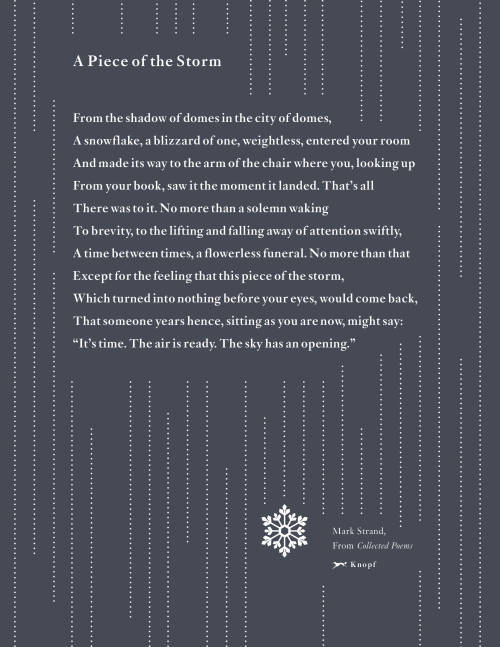#mark strand
byMark Strand
In a field
I am the absence
of field.
This is
always the case.
Wherever I am
I am what is missing.
When I walk
I part the air
and always
the air moves in
to fill the spaces
where my body’s been.
We all have reasons
for moving.
I move
to keep things whole.(fromSelected Poems)
Mark Strand (1934 - 29 November 2014)
[photo, nd © Mary Noble Ours]
I was in the bathtub when Jorge Luis Borges stumbled in the door. “Borges, be careful,” I yelled. “The floor is slippery and you are blind.” Then, soaping my chest, I said, “Borges, have you ever considered what is implicit in a phrase like "I translate Apollinaire into English”? or “I translate de la Mare into French”? that we take the highly idiosyncratic work of an individual and render it into a language that belongs to everyone and to no one, a system of meanings sufficiently general to permit not only misunderstandings but to throw into doubt the possibility of permitting anything else?“
"Yes,” he said, with an air of resignation.
“Then don’t you think,” I said, “that the translation of poetry is best left to poets who are in possession of an English they have each made their own, and that language teachers, who feel responsibility to a language not in its modifications but in its monolithic entirety, make the worst translators?
Wouldn’t it be best to think of translation as a transaction between individual idioms, between, say, the Italian of D'Annunzio and the English of Auden? If we did, we could end irrelevant discussions of who has and who hasn’t done a correct translation.”
“Yes,” he said, seeming to get excited.
“Say,” I said. “If translation is a kind of reading, the assumption or transformation of one personal idiom into another, then shouldn’t it be possible to translate work done in one’s own language? Shouldn’t it be possible to translate Wordsworth or Shelley into Strand?”
“You will discover,” said Borges, “that Wordsworth refuses to be translated. It is you who must be translated, who must become, for however long, the author of The Prelude. That is what happened to Pierre Menard when he translated Cervantes. He did not want to compose another Don Quixote – which would be easy – but the Don Quixote. His admirable ambition was to produce pages which would coincide – word for word and line for line – with those of Miguel de Cervantes. The initial method he conceived was relatively simple: to know Spanish well, to re-embrace the Catholic faith, to fight against the Moors and Turks, to forget European history between 1602 and 1918, and to be Miguel de Cervantes. To compose Don Quixote at the beginning of the seventeenth century was a reasonable, necessary, and perhaps inevitable undertaking; at the beginning of the twentieth century it was almost impossible.”
“Not almost impossible,” I said, “but absolutely impossible, for in order to translate one must cease to be.” I closed my eyes for a second and realized that if I ceased to be, I would never know.
“Borges…” I was about to tell him that the strength of a style must be measured by its resistance to translation.
“Borges…” But when I opened my eyes, he, and the text into which he was drawn, had come to an end.
– Mark Strand, Translation, from The Continuous Life (Knopf, 1990)
Post link
In the work of Mark Strand (1934–2015), desolation and isolation come to have their own cadence — one of timelessness, acceptance, and even sly comfort extended to the reader. (This classic, known by heart to Strand’s fans, seemed to call out for a broadside.)
A Piece of the Storm
From the shadow of domes in the city of domes,A snowflake, a blizzard of one, weightless, entered your room
And made its way to the arm of the chair where you, looking up
From your book, saw it the moment it landed. That’s all
There was to it. No more than a solemn waking
To brevity, to the lifting and falling away of attention, swiftly,
A time between times, a flowerless funeral. No more than that
Except for the feeling that this piece of the storm,
Which turned into nothing before your eyes, would come back,
That someone years hence, sitting as you are now, might say:
“It’s time. The air is ready. The sky has an opening.”
More on this book and author:
- Learn more about Collected Poems by Mark Strand.
- Browse other books by Mark Strand.
- Visit our Tumblr to peruse poems, audio recordings, and broadsides in the Knopf poem-a-day series.
- To share the poem-a-day experience with friends, pass along this link.
Post link










forgetfulness, an absence, a mere nothing.
Phillip B. Williams, “Final Poem for My Father Misnamed in My Mouth,” published in the New Yorker // Mark Strand, “Keeping Things Whole,” via the Poetry Society of America // Rebecca Doverspike, from “Every present thing, a ghost of something,” Every Present Thing a Ghost: Poems // Artworks by Holly Warburton//W.S. Merwin,“Separation” from The Second Four Books of Poems // W.S. Merwin, from “After the Voices,” The Moon Before Morning // Siobhan Vivian,Same Difference//Audrey Niffenegger, from ‘The Time Traveler’s Wife’ // Haruki Murakami,Blind Willow, Sleeping Woman: 24 Stories // Rosario Castellanos, tr. by Julian Palley, from Meditation on the Threshold: A Bilingual Anthology of Poetry; “Destiny”

![Mark Strand (1934 - 29 November 2014)[photo, nd © Mary Noble Ours]I was in the bathtub when Jorge Mark Strand (1934 - 29 November 2014)[photo, nd © Mary Noble Ours]I was in the bathtub when Jorge](https://64.media.tumblr.com/a1415f081504de4e915b922cca76d806/tumblr_nfttplM05f1qcl8ymo1_r1_500.jpg)
